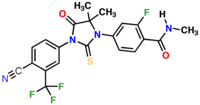
Photo from wikipedia
Micro‐Abstract Therapeutic options for metastatic castration‐resistant prostate cancer have considerably changed in the past decade. In this retrospective analysis of patients included in the Swiss Enzalutamide Named Patent Program, we… Click to show full abstract
Micro‐Abstract Therapeutic options for metastatic castration‐resistant prostate cancer have considerably changed in the past decade. In this retrospective analysis of patients included in the Swiss Enzalutamide Named Patent Program, we analyzed the outcome of patients based on different sequencing strategies reflecting current daily practice. We demonstrate a median overall survival of more than 3 years and different effects in regard to treatment sequences. Background: Enzalutamide is a second‐generation androgen receptor (AR) inhibitor that binds to and blocks the AR with higher affinity than previously available AR inhibitors. High activity has been proven in patients with metastatic castration‐resistant prostate cancer (mCRPC) previously treated with docetaxel and in chemotherapy‐naive patients with mCRPC. However, its activity in patients previously treated with other novel agents (for example, abiraterone and/or cabazitaxel), remains controversial. Patients and Methods: The aim of this retrospective analysis of the Swiss Enzalutamide Named Patient Program was to evaluate clinical efficacy and safety of enzalutamide treatment in patients with mCRPC progressing after docetaxel and other lines of therapy considering different treatment sequences. We report on 44 patients treated with enzalutamide. Results: The median survival time from diagnosis of CPRC was 41.1 months (95% confidence interval [CI], 32.3‐49.8 months). Enzalutamide was used as a second, third, fourth, fifth, sixth, or seventh‐line therapy in 13%, 20%, 31%, 20%, 11%, and 2% of patients. The median duration of enzalutamide treatment was 3.0 months (range, 1‐21 months). Median progression‐free survival was 3.0 months (95% CI, 2.4‐3.7 months). The estimated median overall survival was 6.3 months (95% CI, 4.6‐8.1 months). Sixteen patients (36.4%) had a prostate‐specific antigen decrease of ≥ 30%, and 11 patients (25.0%) of ≥ 50%, respectively. In multivariate analysis, the absence of previous therapy with abiraterone and a prostate‐specific antigen response of ≥ 50% on enzalutamide therapy were significantly associated with overall survival on enzalutamide treatment. Conclusions: Our results show that enzalutamide has modest activity in extensively pretreated patients. However, there is a subgroup of patients achieving benefit from enzalutamide therapy even after pretreatment with abiraterone.
Journal Title: Clinical Genitourinary Cancer
Year Published: 2017
Link to full text (if available)
Share on Social Media: Sign Up to like & get
recommendations!